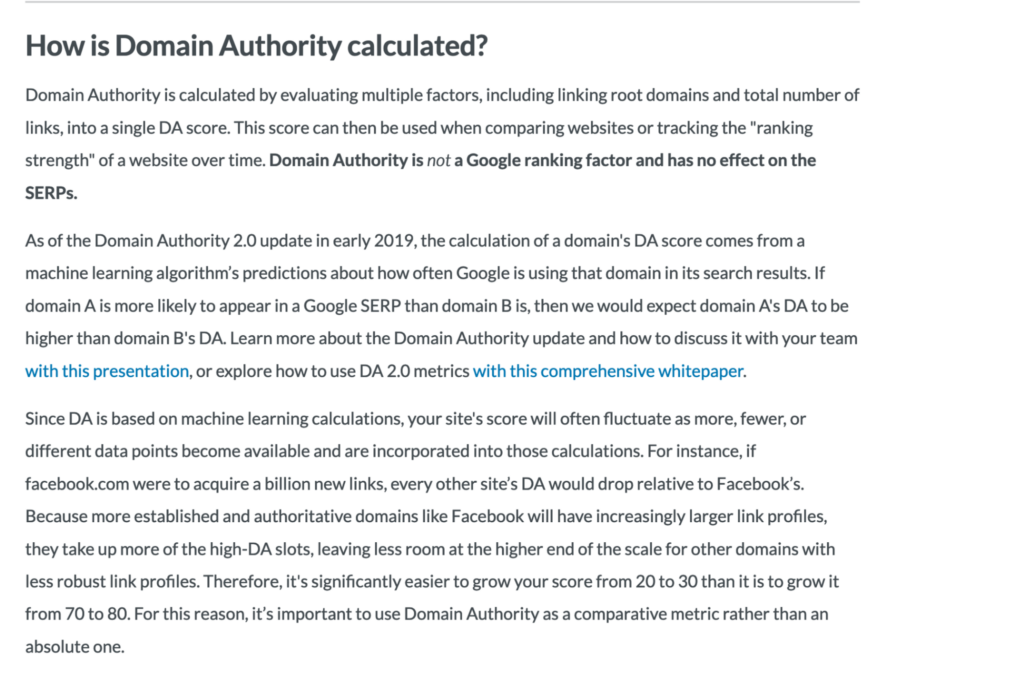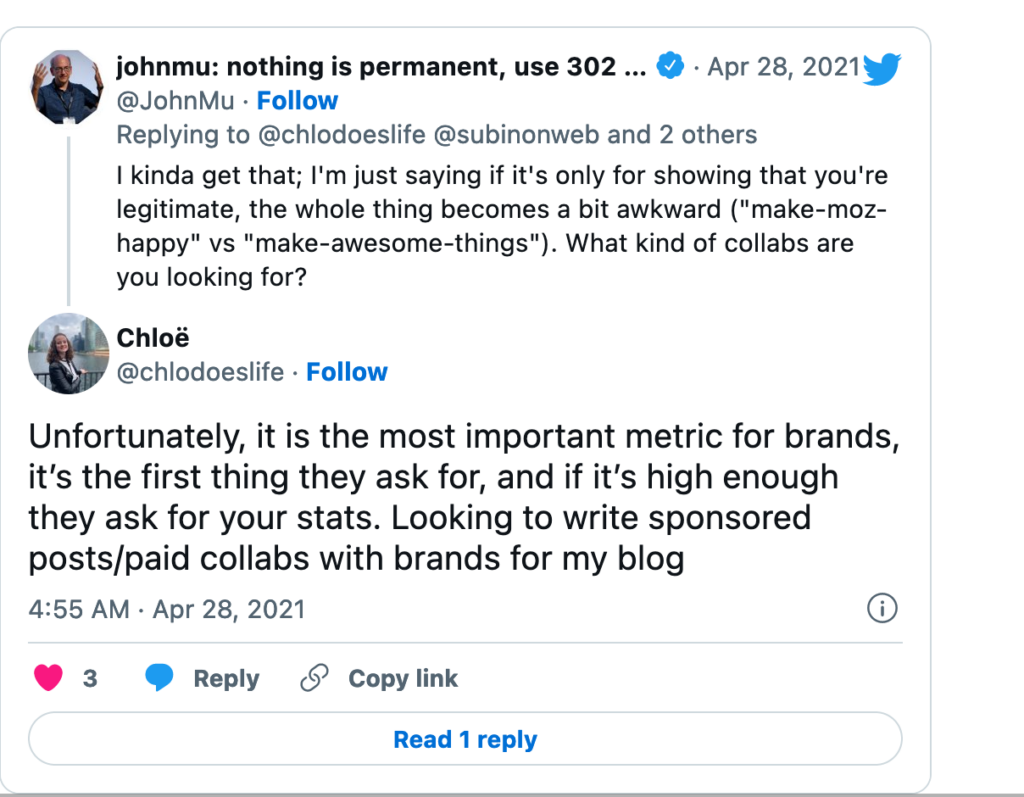What is Domain Authority?
In the very simplest terms, Domain Authority is a proprietary metric that was created by one of the largest SEO tool providers in the world, Moz. Moz, formerly known as SEOMoz for those who go back that far, offers a lot of SEO tools and advice, and some of the longest-serving SEOs in the business work for the company. Since its inception in 2004 – yes, SEO is really that old – it’s come to be one of the major players in the game, as far as insights and tools go.
Domain Authority is perhaps one of its best-known offerings. And given that a Moz subscription could not be described as cheap, we’re pretty sure it’s a big money maker for them.
The likelihood that a website will appear in search engine results is measured by the domain authority metric. Higher scores on the 0-100 scale of Domain Authority indicate a larger likelihood of ranking. So says Moz. This often leads to people becoming obsessive over their DA score. This often leads to people becoming obsessive over their DA score. If you are also worried about the same thing, try using Moz or an online DA checker to determine your website’s authority score regularly.
However, over the years people have also become very confused, and have come to believe that in some way that DA is a real Google metric. Which is problematic, because it’s not.
How is Domain Authority Calculated?
Anyone who has spent more than 15 minutes reading about SEO will know that it is a very inexact science that involves a LOT of educated guesswork about the way Google chooses to rank websites and webpages in its search results. The fact that Domain Authority is also a rather mystical, shrouded algorithmic calculation – that gets updates in much the same way that the real Google algorithms do – complicates things here too.
This is exactly what Moz currently has to say on the matter, on its website:
As you can see, the wording that advises it is NOT a Google ranking factor and it DOES NOT influence SERPs results. It’s a tool. One that you can choose to use, or choose not to use. So why are so many people still so concerned with Domain Authority and raising that score, if it’s not something that will boost their place in the SERPs? That’s what we have to get into next.
To DA or not DA?
Before we continue, it’s worth repeating again: Domain Authority is not an official Google metric, and Google has been, and is, very clear on that. Moz itself? They do, throughout their website, as you can see above, if you read through it, now make that pretty clear too (that was not always the case.)
To confuse matters even further, some of the other large SEO tool companies also offer their own version of Domain Authority. Ahrefs offers their ‘Ahrefs Rank‘ (which they once called domain ranking which caused even more confusion) and Semrush offer their ‘Authority Score‘ (perhaps the least misleading moniker of the three.)
Whether or not you should include yourself with Domain Authority as a part of your SEO strategy is where the controversy lies.
The best illustration of this was a Twitter thread created late in 2021. It involved a young blogger seeking advice on boosting her Domain Authority Score, John Mueller, who is one of Google’s best-known Search Advocates and a man SEOs pay a lot of attention to, Barry Schwartz, one of the longest-serving and most respected SEO practitioners in the business and many others:
The difficulty here is clear, and it’s not something that gets resolved. The blogger knows that her DA should not matter, but explains why it does. John Mueller reiterates that it does not matter, and offers some advice on what she should be worried about, as do others.
But it really does not solve her immediate problem. Whether they are wrong or not, her potential sources of links and even revenue value that DA score. And one blogger probably isn’t going to change their mind, especially if even John Mueller can’t!
It’s something we have come up against for our clients at Pearl Lemon. For all that we can explain this, and offer the same arguments as John, Barry and others, they may still want or need, to be able to demonstrate that higher Domain Authority score. You may want or need to as well. This brings us to the second half of this guide: how to increase your Domain Authority score.
How to Increase Your Domain Authority Score
So you have decided that you do want, or need, to boost your Domain Authority score. Cool. Before we get into offering our tried and tested advice for doing so, there are a few more things you need to know (hey, we did call this a BIG guide.)
A website’s low DA is “not a signal” that it is useless. Even a website with a very low DA can appear where it should be on page one in search results. It might score very highly.
Because Moz uses a logarithmic scale, it takes some time for the score to reflect any work you do.
It becomes more difficult to obtain a higher DA as your DA score rises. Moz admits that (see above.) For instance, if you use the best techniques for increasing your Domain Authority, your site can pretty quickly reach a DA of 20 to 30.
However, increasing DA between the ranges of 31 and 40 and 70 and 80 DA becomes more difficult. Anything higher belongs usually to very large, established sites maintained usually by very prominent entities.
It seems that a higher DA score is also often the result of many years of accumulation. The domain age, in our opinion, is really quite important for raising your DA score. This indicates that you cannot boost your website’s DA from 1 to 50 in a week, and the outcome of all your work might not be apparent for several months.
Having said that, an older site with a very low DA could be a sign of poor links and minimal traffic. Or not.
Google penalties are not taken into account by the DA algorithm. Naturally, a domain that receives a Google penalty falls in the ranks, although Moz may not be aware of this. Therefore, even though the domain is being penalized, its domain authority will still remain high.
Only about 40 factors are taken into account by Domain Authority, compared to hundreds included by Google’s ranking algorithm (the precise number is unknown, however, some estimates put that number at over 200).
There is one certainty though when it comes to boosting your Domain Authority score:
A few minor adjustments here and there won’t cause your DA to soar. In that, it’s exactly the same as any of the SEO work you do with Google’s algorithm specifically in mind (which should really always be your top priority) You are going to need to put in some serious work. The good news is though that a lot of the work you do to boost your DA is very similar to the work you should be doing to please Google.
So, to those tips. While far from being comprehensive, here are some of the things that we think – and that’s based on our own work for Pearl Lemon Group sites and for many client sites and a LOT of testing – you should be doing to increase your Domain Authority score.
Work on Your Link Profile
As far as Moz and its Domain Authority score is concerned, the most crucial metric is your link profile. The DA score of websites with strong, clean link profiles will be greater than those with weak link profiles. Google gives links a lot of weight too, although they are not so heavily focused on them as the Domain Authority score is. So working on your link profile will help you in the SERPs too.
Link building is hard, and getting it wrong can be ruinous for your website, never mind your DA score. Link building is a huge topic on its own and from our long experience, we can tell you that it is something that beginners find difficult to understand and execute. This is why they start doing silly things like buying blackhat links that end up getting their site penalized by Google (although they sometimes boost their DA score because Moz does not know much about Google penalties, as we mentioned.)
So you’ll need to build a good link profile, but slowly and carefully.
There are two big ways to do this effectively:
Natural link building involves creating, publishing and promoting content people just want to link to because it’s interesting, engaging, useful, funny or whatever they happen to think is worth a link. It’s the Google ideal – their Utopian idea of how the whole link-building thing should work.
This all takes time, effort, commitment and patience. It works, but never overnight.
Link outreach is your other big option, and that too is not easy. And it’s the form of link building that can get you into a lot of trouble with Google if you don’t play by their sometimes complex rules. If you are going to try it, getting some expert help is NEVER going to be a bad idea.
Work on Your Technical SEO
Technical SEO is often related to one-time SEO activities, and after you get it right the first time, you typically don’t have to deal with it all that much more.
The technical SEO aspects of your website, on the other hand, might have a significant impact on your Domain Authority and SERP rankings.
The essential technical SEO parameters you should check include:
- Registering your website with Bing Webmaster tools and Google Search Console.
- Building your XML sitemap, optimizing it, and submitting it to Google and Bing
- Making sure that Google and other search engine spiders can explore your website without issues, by checking your robots.txt settings and running Fetch as Google.
- Think about switching your website over to HTTPS
- Including structured data (schema) information that will aid search engines in understanding the context of your content.
- Ensuring that the breadcrumb navigation on each page is well defined.
- Use hreflang appropriately (if you have a multilingual website)
Again, this is easy stuff to get wrong if you are not a code person, so you may need some professional help.
Make Sure Your Site is Fast and Mobile Friendly
A fast site that displays well on mobile is not nice to have, it’s a must. It’s a must for Google, for Domain Authority and your DA score, and for those who use it. Everyone hates slow websites.
Mobile first has been the Google standard for several years now. Yes, your site may still have lots of desktop users visiting it, but you know from, well, living in 2022, that more and more people rely on their mobile devices to access the Internet and do what they need to do there. Google knows that too, so it prioritizes the mobile experience. It matters for your DA score because no one wants to link to a slow site.
Yes, You Should Sweat the Social Stuff
There is a definite association between pages that rank highly on Google and social signals, even though Google has repeatedly declared that social signals are not part of the Google Ranking algorithm.
They matter for DA because strong social signals are often something those interested in (maybe) linking to your site will probably take into account too. Influencers and bloggers, for example, looking for links probably won’t seem like a good placement prospect to many if they don’t have the social presence potential link ‘partners’ want to see.
This does not mean that you suddenly have to start using social networks that don’t make sense for your brand (not all of them do) You just need to develop a stronger presence on those that do.
On that note, you may want to put a little more thought into another often-overlooked aspect of digital marketing: formal public relations. Not only will a good PR campaign get you featured in articles, but posts etc on high SERPs ranking sites it will also often get you those high-quality backlinks that the Domain Authority scoring algorithm values so much.
Don't Drive Yourself Crazy Over DA
Be careful not to become too fixated on your domain authority score. It’s basically a figure that compares your domain’s strength to those of other domains in the Moz database.
A low DA score does not guarantee poor Google performance for your website.
A high DA score indicates that you are on the right track, but it is only a prediction and does not ensure that you will receive better ranks or more visitors
Always strive to keep the big picture in mind while developing a website so that it can over time obtain dependable rankings in Google and other search engines which should always be the ultimate end goal of good SEO.














